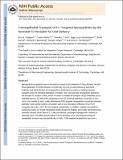Transepithelial Transport of Fc-Targeted Nanoparticles by the Neonatal Fc Receptor for Oral Delivery
Author(s)
Pridgen, Eric M.; Alexis, Frank; Kuo, Timothy T.; Levy-Nissenbaum, Etgar; Karnik, Rohit; Blumberg, Richard S.; Langer, Robert; Farokhzad, Omid C.; ... Show more Show less
DownloadLanger_Transepithelial.pdf (996.0Kb)
OPEN_ACCESS_POLICY
Open Access Policy
Creative Commons Attribution-Noncommercial-Share Alike
Terms of use
Metadata
Show full item recordAbstract
Nanoparticles are poised to have a tremendous impact on the treatment of many diseases, but their broad application is limited because currently they can only be administered by parenteral methods. Oral administration of nanoparticles is preferred but remains a challenge because transport across the intestinal epithelium is limited. We show that nanoparticles targeted to the neonatal Fc receptor (FcRn), which mediates the transport of immunoglobulin G antibodies across epithelial barriers, are efficiently transported across the intestinal epithelium using both in vitro and in vivo models. In mice, orally administered FcRn-targeted nanoparticles crossed the intestinal epithelium and reached systemic circulation with a mean absorption efficiency of 13.7%*hour compared with only 1.2%*hour for nontargeted nanoparticles. In addition, targeted nanoparticles containing insulin as a model nanoparticle-based therapy for diabetes were orally administered at a clinically relevant insulin dose of 1.1 U/kg and elicited a prolonged hypoglycemic response in wild-type mice. This effect was abolished in FcRn knockout mice, indicating that the enhanced nanoparticle transport was specifically due to FcRn. FcRn-targeted nanoparticles may have a major impact on the treatment of many diseases by enabling drugs currently limited by low bioavailability to be efficiently delivered though oral administration.
Date issued
2013-11Department
MIT-Harvard Center for Cancer Nanotechnology Excellence; Massachusetts Institute of Technology. Institute for Medical Engineering & Science; Massachusetts Institute of Technology. Department of Chemical Engineering; Massachusetts Institute of Technology. Department of Mechanical Engineering; Koch Institute for Integrative Cancer Research at MITJournal
Science Translational Medicine
Publisher
American Association for the Advancement of Science (AAAS)
Citation
Pridgen, E. M., F. Alexis, T. T. Kuo, E. Levy-Nissenbaum, R. Karnik, R. S. Blumberg, R. Langer, and O. C. Farokhzad. “Transepithelial Transport of Fc-Targeted Nanoparticles by the Neonatal Fc Receptor for Oral Delivery.” Science Translational Medicine 5, no. 213 (November 27, 2013): 213ra167–213ra167.
Version: Author's final manuscript
ISSN
1946-6234
1946-6242